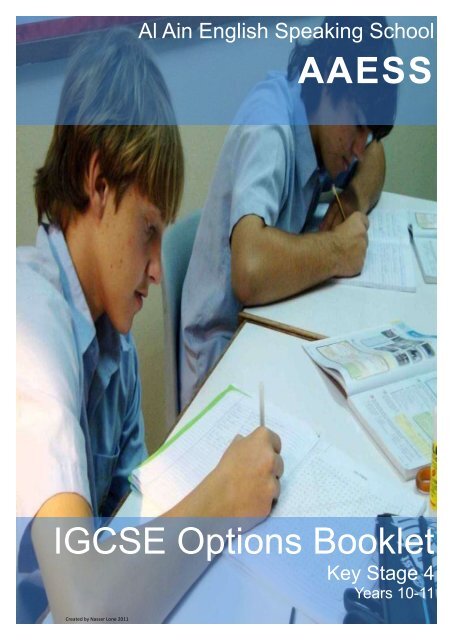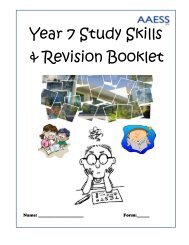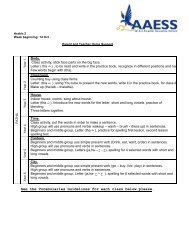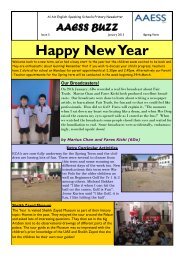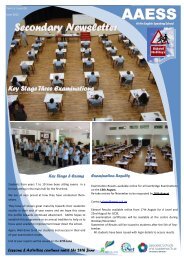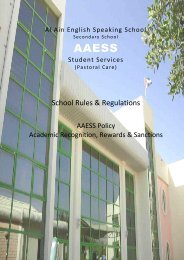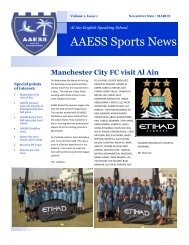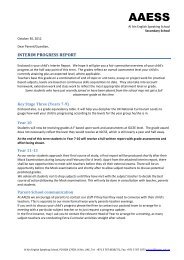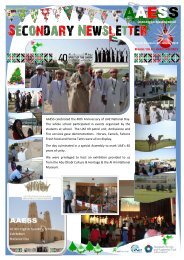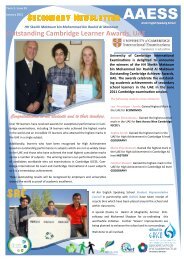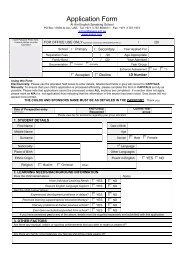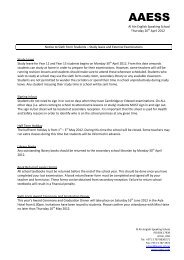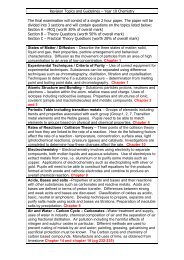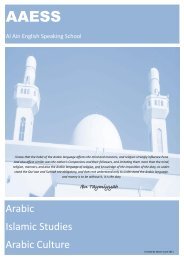AAESS IGCSE Options Booklet - Al Ain English Speaking School ...
AAESS IGCSE Options Booklet - Al Ain English Speaking School ...
AAESS IGCSE Options Booklet - Al Ain English Speaking School ...
Create successful ePaper yourself
Turn your PDF publications into a flip-book with our unique Google optimized e-Paper software.
<strong>Al</strong> <strong>Ain</strong> <strong>English</strong> <strong>Speaking</strong> <strong>School</strong><br />
<strong>AAESS</strong><br />
<strong>IGCSE</strong> <strong>Options</strong> <strong>Booklet</strong><br />
Key Stage 4<br />
Years 10-11<br />
Created by Nasser Lone 2011
Created by Nasser Lone 2011<br />
<strong>AAESS</strong><br />
2
The International General Certificate of Secondary Education (<strong>IGCSE</strong>) has been designed for 14 to 16<br />
year olds and aims to prepare students for further academic success, including progression to A and<br />
AS Level study, and equip students with the skills needed for immediate employment. <strong>IGCSE</strong> is equivalent<br />
in standard to the British GCSE and is recognised as evidence of ability by academic institutions<br />
and employers around the world. Indeed, the terms GCSE and <strong>IGCSE</strong> are used interchangeably.<br />
3<br />
At <strong>AAESS</strong> we place great emphasis on each<br />
student achieving their full potential and in<br />
order to do this we aim to work closely with<br />
parents and students in choosing the correct<br />
balance of subjects to follow in Year 10. We<br />
offer a wide range of subjects and the descriptions<br />
in this book are to give both parents<br />
and students an insight into what the<br />
subject will involve.<br />
Why choose <strong>AAESS</strong>? Why does <strong>AAESS</strong> choose <strong>IGCSE</strong>?<br />
Over the years, the school has built up a great deal of<br />
experience in the teaching of <strong>IGCSE</strong> subjects and effective<br />
preparation for examinations. <strong>Al</strong>l our senior<br />
staff are experienced <strong>IGCSE</strong> teachers and we believe<br />
that this is vital to ensure that students receive the<br />
best preparation for their <strong>IGCSE</strong> examinations.<br />
However, at <strong>AAESS</strong> we do not feel that we are just<br />
preparing students for examinations. Throughout their<br />
time in the school we will work closely with each individual<br />
to ensure they achieve their full potential.<br />
What Should I Be Aiming to Achieve?<br />
The minimum target for all students should be at least<br />
5 <strong>IGCSE</strong>s at grade C or higher, This allows entry to<br />
the <strong>AAESS</strong> 6th Form and from there, progress to University<br />
in the UK, Middle East or elsewhere in Europe<br />
and North America.<br />
Created by Nasser Lone 2011<br />
<strong>Al</strong> <strong>Ain</strong> <strong>English</strong> <strong>Speaking</strong> <strong>School</strong><br />
However, before choosing subjects, students<br />
should be encouraged to meet the<br />
subject teachers and discuss whether a<br />
particular subject is the right choice.<br />
The <strong>IGCSE</strong> curriculum allows teaching to be<br />
placed in a localised context, making it relevant<br />
in different regions and to children of<br />
different nationalities.<br />
It is also suitable for students whose first language<br />
may not be <strong>English</strong> and this is<br />
acknowledged throughout the examination<br />
progress.
<strong>IGCSE</strong> provides a broad study programme by<br />
drawing subjects from five areas;<br />
Languages<br />
Humanities & Social Sciences<br />
Mathematics<br />
Science<br />
Creative, Technical and Vocational<br />
4<br />
Subjects Offered<br />
What subjects can I study?<br />
At <strong>AAESS</strong> we are in the enviable position of having high quality staff who are able to teach their specialist<br />
subject to the highest level. This allows us to offer a comprehensive range of subjects as shown<br />
below.<br />
Compulsory <strong>IGCSE</strong> Subjects Optional <strong>IGCSE</strong> Subjects<br />
<strong>English</strong> Language (First or Second Language)<br />
<strong>English</strong> Literature (For First Language speakers)<br />
Mathematics<br />
Science (of the student’s choice)<br />
Arabic (for first language students who want to continue<br />
their studies in this part of the world)<br />
Core PE (practical lesson)<br />
Islamic Studies (for Muslim students)<br />
Created by Nasser Lone 2011<br />
<strong>Al</strong>l students must study<br />
<strong>English</strong> Language & Literature<br />
Mathematics<br />
Science (at least one)<br />
A Good Combination<br />
You may choose 5 subjects from the list below<br />
Drama ICT<br />
Music PE GCSE<br />
Art Spanish<br />
Arabic Second Language French<br />
History Biology<br />
Geography Physics<br />
Business Studies Chemistry<br />
Economics Travel & Tourism<br />
Within the curriculum there is a balanced mix of<br />
practical experience and theoretical knowledge.<br />
Differing abilities are accommodated with a<br />
choice of Core (or Foundation) and Extended (or<br />
Higher) papers in most subjects, making <strong>IGCSE</strong><br />
suitable for all students. Core levels allow<br />
achievement at grades C to G, whereas Extended<br />
levels cater for achievement at grades A* to<br />
E.<br />
Sixth Form<br />
5 passes (A* to C grades) are required to<br />
enter Sixth Form at <strong>AAESS</strong>.
What are <strong>IGCSE</strong>s and GCSEs?<br />
GCSE stands for General Certificate of Secondary<br />
Education. It's highly valued by schools, colleges and<br />
employers so will be useful whatever you are planning<br />
to do afterwards.<br />
The qualification mainly involves studying the theory<br />
of a subject, combined with some investigative work.<br />
Some subjects also involve practical work. GCSEs<br />
are studied full-time at school, taking five terms to<br />
complete.<br />
<strong>IGCSE</strong>s and GCSEs are two year courses; examinations<br />
are taken in June of Year 11. An employer<br />
or good UK University would expect you to<br />
have eight GCSEs –at grade C or above and including<br />
<strong>English</strong>, Mathematics and at least one<br />
Science. We at <strong>AAESS</strong> expect you to show a<br />
commitment to the two year course and to sit the<br />
final examination. By the end of September in<br />
Year 10 we will accept no more swaps or changes.<br />
We at <strong>AAESS</strong> are committed to providing the<br />
best education for you and we want you to take<br />
full advantage of this provision.<br />
We strongly advise that students do not drop<br />
a course unless advised by the school.<br />
Created by Nasser Lone 2011<br />
Two Year Courses<br />
Your Questions Answered<br />
5<br />
The difference between <strong>IGCSE</strong> and GCSE?<br />
The <strong>IGCSE</strong> is an international qualification and the<br />
content of the syllabus is better geared to students<br />
from an international background and is less specific to<br />
Britain. The GCSEs and <strong>IGCSE</strong>s that we offer here at<br />
<strong>AAESS</strong> are however not culturally specific but we believe<br />
them to be better and more appropriate for you.<br />
Most International <strong>School</strong>s offer a mixture of both<br />
GCSE and <strong>IGCSE</strong>.<br />
Both of these qualifications are internationally recognised<br />
and the school will provide Transfer Certificates<br />
if required showing the equivalence to other systems of<br />
education.
At <strong>AAESS</strong> we regard each student as an individual<br />
and expect everyone to reach their<br />
full potential. In order to support this process,<br />
each student will be set personal targets<br />
in each subject they are studying.<br />
These targets are based on previous work<br />
and scores achieved in National Curriculum<br />
assessments at the end of Year 9.<br />
Students are also set targets for improvement<br />
with tutors twice a year.<br />
We will then work closely with students and<br />
parents to ensure that these targets are met.<br />
Your Questions Answered<br />
To help you decide what to study in Years 10 and<br />
11, start by asking yourself what you enjoy doing<br />
and what you’re good at.<br />
Think about:<br />
what you’re interested in: it could be other cultures<br />
and languages, writing projects, helping<br />
people, being outdoors or designing things<br />
what types of activity you enjoy most - working<br />
things out and thinking them through, practical<br />
activities or artistic options like painting, drawing<br />
or performing music<br />
what you're like at home, as well as in school -<br />
what skills have you developed following outside<br />
interests?<br />
Do not choose subjects because your friends are doing them!<br />
Do not choose subjects because you do or don’t like the teacher!<br />
Do read the information in this booklet carefully and take your time as this is a very important<br />
decision.<br />
Do listen carefully to all the information you will be presented with over the coming weeks.<br />
Useful websites<br />
www.connexions-direct.com/whichwaynow - very useful student centred resource that offers a lot of<br />
advice, guidance and information.<br />
www.direct.gov.uk/en/EducationAndLearning/14To19/ - British Government site that offers all sorts of<br />
information and links to other sites.<br />
www.cie.org.uk - the official website of the Cambridge Examination Board; the board for the <strong>IGCSE</strong>s<br />
that the school offers.<br />
www.edexcel.com – the official website for the GCSEs that the school offers.<br />
6<br />
What sort of person are you?<br />
Personal Targets Where can you get help and advice?<br />
Created by Nasser Lone 2011<br />
Remember<br />
The choices are yours, but most people look<br />
for advice on important decisions. There’s plenty<br />
available, but you should do as much as you<br />
can yourself to research all the options.<br />
Parents, tutors, family and friends probably<br />
know you best, so talking to them can help you<br />
work out what might suit you. But remember<br />
that they won’t always know a lot about careers<br />
or courses you’re interested in. If you’re planning<br />
to work towards a particular career or college<br />
course, don’t be put off just because it<br />
means taking a different direction from friends<br />
or family members.
1 Arabic<br />
2 Art & Design<br />
3 Business Studies<br />
4 Drama<br />
5 Economics<br />
6 <strong>English</strong> Language/Literature<br />
7 <strong>English</strong> as Second Language<br />
8 Geography<br />
9 History<br />
10 ICT<br />
11 Islamic Studies<br />
12 Mathematics<br />
13 Music<br />
14 Modern Foreign Languages (MFL) (French & Spanish)<br />
15 Physical Education<br />
Science<br />
16 Biology<br />
17 Chemistry<br />
18 Physics<br />
19 Travel & Tourism<br />
Created by Nasser Lone 2011<br />
<strong>IGCSE</strong> Subjects<br />
7
To enable students to develop:<br />
an understanding of Arabic in a<br />
variety of contexts,<br />
knowledge of Arabic vocabulary<br />
and structures,<br />
transferable language skills,<br />
the ability to communicate effectively in Arabic,<br />
awareness and understanding of countries, cultures and communities<br />
where Arabic is spoken.<br />
Assessment Objective % Method of Assessment Time<br />
1.Listening and understanding<br />
(5AR01)<br />
23%<br />
2. <strong>Speaking</strong> (5AR02) 27%<br />
3. Reading and Understanding<br />
(5AR03)<br />
23%<br />
4. Writing (5AR04) 27%<br />
Arabic 2<br />
We will be offering an Edexcel course for non Arab native speakers and<br />
a UAE Ministry of Education course for Arab native speakers.<br />
* The Arabic Language course is compulsory for Arab native<br />
speakers.<br />
Terminal examination<br />
(externally assessed)<br />
Terminal examination<br />
(externally assessed)<br />
Terminal examination<br />
(externally assessed)<br />
Terminal examination<br />
(externally assessed)<br />
Ministry of Education Examinations (Arabic 1)<br />
45 minutes (+5<br />
minutes reading<br />
time<br />
8 – 10 minutes<br />
55 minutes<br />
1 hour<br />
<strong>Al</strong>though the MOE course is compulsory for Arab Passport holders,<br />
it will be up to the student to choose whether or not they wish to be<br />
entered for the examination in Year 12.<br />
Non native Arab speakers can apply for the MOE test and the<br />
school will provide a special preparation course for them.<br />
The school will register the student with the Local Ministry Education<br />
office.<br />
Created by Nasser Lone 2011<br />
8<br />
Arabic (1607/6)<br />
Edexcel Examinations Board<br />
<strong>Al</strong> <strong>Ain</strong> <strong>English</strong> <strong>Speaking</strong> <strong>School</strong> is proud to teach our students the Arabic<br />
language, and seeks always to recruit qualified and experienced teachers<br />
who are able to use modern, educational and interesting methods.<br />
<strong>AAESS</strong> offers the British National curriculum but we find that a large<br />
number of the students are non Arabs. This gives the school and the<br />
teacher the responsibility to teach them Arabic through using audiovisual<br />
aids according to the student’s individual needs.<br />
Arabic 1<br />
As for the Arab students, the school is using the local curriculum from<br />
the Ministry of Education, it is a limited subject but the teacher is always<br />
free to be creative and present the subject in an interesting way and to<br />
enhance the student to love his mother language. The teacher is doing<br />
his educational role as he is encouraging the students to behave well<br />
and love their country and learn how to treat others sensibly, as well as<br />
teaching them the right pronunciation and how to read properly.<br />
To support the teaching of the course<br />
there are past papers available and the<br />
department has a wide variety of resources<br />
from the Arabic 1 courses to<br />
draw upon. We are also researching<br />
the availability of resources in the UK.<br />
Keep up to date with the latest news<br />
and resources available at the Edexcel<br />
website at www.edexcel.com/gcse<br />
Obviously given our situation in the<br />
UAE the number of ‘real’ resources<br />
available to us is more valuable than<br />
any text book could possibly be and<br />
will also give students a real sense of<br />
relevance to their studies.
9<br />
Art & Design (2AD01)<br />
Edexcel Examinations Board<br />
The GCSE Art & Design course focuses on three main areas: knowledge, skills and understanding. It combines<br />
the academic study of art with creative activities and the development of practical skills. The purpose of the<br />
theory work is so that pupils gain an understanding of art practices both past and present. Students are required<br />
to research artists, explore their styles and genres, whilst investigating a range of materials, techniques and processes.<br />
Drawing from this research and investigation, students are encouraged to explore new avenues as they<br />
move their work towards a final piece. <strong>Al</strong>l students are entered into the unendorsed option where they may cross<br />
over into other disciplines: photography, 3 dimensional design, textiles and fine art.<br />
2 Units<br />
Year 10 + 11 Coursework : 2 major projects 60% of<br />
GCSE mark<br />
Year 11: Externally set examination 40% of GCSE<br />
mark<br />
Photography Competitions<br />
You will be entered into at least one photography<br />
competition per unit of work.<br />
Art Trips<br />
Three art trips are arranged every year within the UAE<br />
to view the work of other local and international artists,<br />
as well as other schools entering the same examination<br />
option.<br />
The projects are guided during the classroom hours<br />
(4 lessons per week).<br />
Research and completion of tasks is done as homework. The art room is<br />
open weekly on a Tuesday from 3-5pm for those students wishing to complete<br />
these weekly tasks. It is optional to attend.<br />
What level of Artistic Skill do I require?<br />
Pupils firstly need to have a keen interest in art. The student should have<br />
competent skills in painting and drawing. It is not advisable for a student to<br />
take art without obtaining at least a level 5B in Key Stage Three.<br />
Created by Nasser Lone 2011
10<br />
Business Studies (0450)<br />
Cambridge <strong>IGCSE</strong> examination in Business Studies which they sit at the end of year 11.<br />
Cambridge International Examinations Board<br />
The <strong>IGCSE</strong> Business Studies syllabus develops students' understanding of business activity in the public and<br />
private sectors, and the importance of innovation and change. Students learn how the major types of business<br />
organisation are established, financed and run, and how their activities are regulated. Factors influencing business<br />
decision-making are also considered, as are the essential values of cooperation and interdependence.<br />
Through their studies, students not only learn about business concepts and techniques but also enhance related<br />
skills such as numeracy and enquiry. The syllabus provides both a foundation for further study at A Level, and<br />
an ideal preparation for the world of work.<br />
Course Aims: The syllabus covers the following key areas of study:<br />
business and the environment in which it operates<br />
business structures, organization and control<br />
business activities to achieve objectives<br />
people in business<br />
regulating and controlling business activity<br />
Course Components<br />
Students should be able to:<br />
1. demonstrate knowledge and understanding of facts, terms,<br />
concepts and conventions appropriate to the syllabus;<br />
2. demonstrate knowledge and understanding of theories and<br />
techniques commonly applied to or used as part of business<br />
behaviour.<br />
Students should be able to:<br />
3. apply their knowledge and understanding of facts, terms, con<br />
cepts and conventions to business problems and issues;<br />
4. apply their knowledge and understanding of theories and tech<br />
niques commonly applied to business problems and issues.<br />
Students should be able to:<br />
5. distinguish between evidence and opinion in a business con<br />
text;<br />
6. order, analyse and interpret information, in narrative, numerical<br />
and graphical forms, using appropriate techniques.<br />
Students should be able to:<br />
7. present reasoned explanations, develop arguments, under<br />
stand implications and draw inferences;<br />
8. make judgements, recommendations and decisions.<br />
Considerations for Entry on Course<br />
Students should be interested in the subject and willing to undertake<br />
essays and projects<br />
Responsibilities of the Student<br />
Students are expected to research topics at home and read widely<br />
with reference to the areas of study. They are expected to complete<br />
work according to the deadlines set.<br />
For the <strong>IGCSE</strong> Business Studies syllabus there are two textbooks<br />
written specifically for the syllabus:<br />
<strong>IGCSE</strong> Business Studies, by Karen Borrington and Peter Stimpson,<br />
3rd Edition, John Murray, ISBN-10: 034092649X<br />
<strong>IGCSE</strong> Business Studies, by Chris Nuttall, Cambridge University<br />
Press, ISBN 0521750954<br />
Created by Nasser Lone 2011<br />
Assessment<br />
The examination consists of two written<br />
papers.<br />
Paper one consist of short answer<br />
questions. It often asks for terms to be<br />
explained or suggestions be made<br />
about particular business situations.<br />
Paper two is a case study paper. The<br />
questions focus around a business<br />
problem or situation that is outlined in<br />
a case study and has a mix of short<br />
and long answer questions. The paper<br />
requires the student to apply business<br />
knowledge and concepts as well as<br />
interpreting information given.<br />
Progression<br />
The Business Studies syllabus at<br />
<strong>IGCSE</strong> is an ideal introduction to ‘A’ and<br />
‘AS’ Level Business Studies, Economics<br />
and Accounting. It is also a good lead<br />
into Diplomas in Business, Business<br />
Administration, Business Administration<br />
(Travel & Tourism), Human Resource<br />
Management, Accounting and Finance,<br />
Marketing and Sales Management as<br />
well as University Business courses.
GCSE Drama is all about understanding what it is like to put yourself in somebody else's shoes. You will play<br />
many parts in different imaginary situations. You will have the opportunity to create your own work, as well as<br />
look at plays written by other people.<br />
The course in three parts<br />
1. Part one of the course you will use Drama to express your feelings and ideas about a range of issues.<br />
2. Part two of the course you will look at a play to see how a playwright expresses their ideas about a theme<br />
or topic, and explore ways of making the play work on stage.<br />
3. Part three of the course you will have the choice of being involved in the performance of a play from an<br />
existing script or from one you create yourselves.<br />
Will I enjoy this course?<br />
You will enjoy this course if you want to study a subject that is both practical and creative. You may have done<br />
some acting before or helped out backstage on a production. You may have always wanted to have a go at<br />
making a play or performing but never had the chance. You will enjoy this course if you enjoy working as part of<br />
a team, as drama involves a lot of group work.<br />
How does it follow on from what I have learned before?<br />
GCSE Drama follows on from drama work that you will have done at Key Stage 3 (Years 7 to 9). You will develop<br />
your improvisation and acting skills to a higher level. You will also look at plays in more detail and look at different<br />
ways of bringing a script alive on stage.<br />
Summary of the specification<br />
Paper Title Description<br />
1 Drama Coursework<br />
(60%)<br />
Unit 1:<br />
Drama Exploration I<br />
Teacher-assessed practical<br />
work supported by<br />
a portfolio of documentary<br />
evidence.<br />
Unit 2:<br />
Drama Exploration II<br />
Teacher-assessed practical<br />
work supported by<br />
a portfolio of documentary<br />
evidence.<br />
2 Drama Performance<br />
(40%)<br />
Externally assessed<br />
practical examination of<br />
ONE of the following<br />
options:<br />
Option A:<br />
Devised performance<br />
Option B:<br />
Scripted performance<br />
Created by Nasser Lone 2011<br />
This unit of coursework is concerned with<br />
the use of drama to explore ideas and issues.<br />
You will have the opportunity to use<br />
drama forms to deepen your knowledge<br />
and understanding of an idea or issue and<br />
to communicate this understanding through<br />
the medium of drama.<br />
The assessment activities for this unit are<br />
set and marked by your teacher within prescribed<br />
guidelines.<br />
**Controlled assessment 2,000 word<br />
write up supervised by teacher on<br />
school premises**<br />
This unit of coursework is concerned with<br />
the exploration of a complete and substantial<br />
play chosen by your teacher. The purpose<br />
of the unit is to give you knowledge<br />
and understanding of the ways in which<br />
playwrights, performers, directors and designers<br />
use the medium of drama to communicate<br />
their ideas to an audience.<br />
The assessment activities for this unit are<br />
set and marked by your teacher within prescribed<br />
guidelines.<br />
**Controlled assessment 1,000 word<br />
write up supervised by teacher on<br />
school premises**<br />
This paper is concerned with the skills required<br />
in drama to perform work to an audience.<br />
You will have the opportunity to<br />
demonstrate your skills as performers or<br />
technicians using any appropriate material<br />
as a stimulus for performance. For Option<br />
C, the stimulus must be a play script.<br />
The assessment activities for this paper are<br />
set by your teacher within prescribed guidelines<br />
and are externally marked.<br />
11<br />
Drama (1699)<br />
Edexcel Examinations Board<br />
What about exams?<br />
The examination for GCSE Drama is a<br />
practical performance. It is worth 40% of<br />
the marks. You will take part in a play that<br />
you have created as a group or rehearsed<br />
from a script. You will be examined on<br />
your acting skills in the performance. You<br />
will perform the play and the examiner<br />
will be present at one of the performances.<br />
Is there any coursework?<br />
The 60% coursework part of the GCSE<br />
Drama course consists of practical performance<br />
work and a written notebook of<br />
evidence. During your course you will<br />
take part in two different workshops that<br />
will be marked by your teacher. In one of<br />
the workshops you will use all that you<br />
have learnt about drama to explore your<br />
responses to a range of material presented<br />
to you by your teacher. In the other<br />
workshop you will explore a play and<br />
show your understanding of drama by<br />
taking part in a number of exercises<br />
based on the play. You will be assessed<br />
on your practical work and on the supporting<br />
notes you keep during the workshops.
What is Economics?<br />
Economics is a Social Science that<br />
studies the CHOICES that individuals,<br />
business, governments and entire<br />
societies make as they cope with<br />
SCARCITY and the INCENTIVES<br />
that influence and reconcile those<br />
choices. (Michael Parkin)<br />
Economics is the study of choices<br />
under the conditions of scarcity.<br />
(Robert Hall and Marc Lieberman)<br />
Course Aims<br />
Develop a sound knowledge and understanding of economic terminology and principles and elementary<br />
economic theory;<br />
Develop basic economic numeracy and literacy and the ability to handle simple data including graphs and<br />
diagrams;<br />
Use the tools of economic analysis in particular situations;<br />
Identify and discriminate between differing sources of information and to distinguish between facts and value<br />
judgements in economic issues;<br />
Employ economic skills, with reference to individual, groups and organisations in order to understand better<br />
the world in which they live;<br />
Participate more fully in decision-making processes as consumers and producers and as citizens of the local,<br />
national and international community; and<br />
Develop an understanding of the economies for developed and developing nations and of the relationships<br />
between them; and to appreciate these relationships from the perspective of both developed and developing<br />
nations.<br />
Course Components<br />
The syllabus covers the following key areas of study:<br />
basic economic problem: choice and the allocation of resources.<br />
the allocation of resources: how the market works; market failure.<br />
the individual as producer, consumer and borrower.<br />
the private firm as producer and employer.<br />
the role of government in an economy.<br />
economic indicators: prices, employment and output.<br />
developed and developing economies: trends in production, population<br />
and living standards.<br />
international aspects.<br />
Considerations for Entry on Course<br />
12<br />
Economics (0455)<br />
Cambridge International Examinations Board<br />
The Economics syllabus will develop an understanding of economic terminology<br />
and principles and of basic economic theory. Students will learn<br />
about the economics of developed and developing nations and how these<br />
interrelate. They will also learn to handle simple data and undertake economic<br />
analysis, evaluate information and discriminate between facts and<br />
value judgements in economic issues. A foundation for further study at A<br />
Level, the syllabus also encourages a better understanding of the world<br />
in which students live, and helps them play an active part in the decisionmaking<br />
process, whether as consumers, producers or citizens of the local,<br />
national and international community.<br />
Assessment<br />
Students should be interested in the subject and willing to undertake essays and projects.<br />
Responsibilities of the Student<br />
The examination consists of three papers:<br />
Paper 1: Multiple choice.<br />
Paper 2: Structured questions.<br />
Paper 3: Analysis and critical evaluation.<br />
The four assessment objectives are:<br />
1. knowledge with understanding,<br />
2. analysis,<br />
3. judgement and decision making,<br />
and<br />
4. critical evaluation<br />
Students are expected to research topics at home and read widely with reference to the areas of study. They<br />
are expected to complete work according to the deadlines set.<br />
Why I should study Economics?<br />
To understand the world better.<br />
To gain self-confidence.<br />
To achieve social change.<br />
To help prepare for other careers.<br />
To become an economist.<br />
Created by Nasser Lone 2011<br />
Economics will be needed if you decide to study:<br />
Economics, International Affairs, Public Administration, Journalism,<br />
Environment , Psychology, Business Management, Accounting,<br />
Finance, Sociology, Engineering, Law, Development and Political<br />
Science amongst others.
The aims of the syllabus are the same for all students. The aims are set<br />
out below and describe the educational purposes of a course in First Language<br />
<strong>English</strong> for the <strong>IGCSE</strong> examination. They are not listed in order of<br />
priority.<br />
The aims are to:<br />
enable students to communicate accurately, appropriately and effectively<br />
in speech and writing,<br />
enable students to understand and respond appropriately to what they<br />
hear, read and experience,<br />
encourage students to enjoy and appreciate variety of language,<br />
complement students’ other areas of study by developing skills of a<br />
more general application. (e.g. analysis, synthesis, drawing of inferences)<br />
<strong>English</strong> First Language(0500)<br />
13<br />
Cambridge International Examinations Board<br />
Students are also encouraged to read widely, both for their own enjoyment and to further their awareness of the<br />
ways in which <strong>English</strong> can be used. Cambridge <strong>IGCSE</strong> First Language <strong>English</strong> also develops more general<br />
analysis and communication skills such as synthesis, inference, and the ability to order facts and present opinions<br />
effectively.<br />
Reading<br />
Candidates will be assessed on their<br />
ability to:<br />
R 1 Understand and collate explicit<br />
meanings.<br />
R2 Understand, explain and collate<br />
implicit meanings and attitudes.<br />
R3 Select, analyse and evaluate<br />
what is relevant to specific purposes.<br />
R4 Understand how writers achieve<br />
effects.<br />
Candidates take either, Or:<br />
Paper 1: Reading Passage<br />
(Core).<br />
1 hour 45 minutes.<br />
Candidates answer two questions on one<br />
passage of 700–800 words.<br />
Eligible for Grades C–G.<br />
50% of total marks.<br />
Paper 2: Reading Passages (Extended).<br />
2 hours.<br />
Candidates answer three questions on two<br />
passages of 600–700 words each, linked by a<br />
common theme.<br />
Eligible for Grades A*–E.<br />
50% of total marks.<br />
And either: Or:<br />
Paper 3: Directed Writing and Composition.<br />
2 hours.<br />
50% of total marks.<br />
Component 4: Coursework Portfolio<br />
Candidates submit three assignments, each of<br />
500–800 words.<br />
50% of total marks.<br />
Created by Nasser Lone 2011<br />
Writing<br />
Candidates will be assessed on their ability<br />
to:<br />
W 1 Articulate experience and express<br />
what is thought, felt and imagined.<br />
W2 Order and present facts, ideas and<br />
opinions.<br />
W3 Understand and use a range of appropriate<br />
vocabulary.<br />
W4 Use language and register appropriate<br />
to audience and context.<br />
W5 Make accurate and effective use of<br />
paragraphs, grammatical structures, sentences,<br />
punctuation and spelling.<br />
<strong>Speaking</strong> and listening<br />
Candidates will be assessed on their<br />
ability to:<br />
S1 Understand, order and present<br />
facts, ideas and opinions.<br />
S2 Articulate experience and express<br />
what is thought, felt and imagined.<br />
S3 Communicate clearly and fluently.<br />
S4 Use language and register appropriate<br />
to audience and context<br />
S5 Listen to and respond appropriately<br />
to the contributions of others.<br />
Centres may also choose to enter candidates for <strong>Speaking</strong><br />
and Listening or for <strong>Speaking</strong> and Listening Coursework.<br />
Marks for these optional components do not contribute to the<br />
overall grade candidates receive for the written components.<br />
Instead, where candidates perform to an appropriate standard,<br />
certificates record achievement of grades 1 (high) to 5<br />
(low).<br />
Optional<br />
Component 5: <strong>Speaking</strong> and Listening (Optional)<br />
Approx. 10–12 minutes. Individual Task and Discussion.<br />
Separately endorsed.<br />
Component 6: <strong>Speaking</strong> and Listening. Coursework<br />
(Optional). Individual activity, Pair-based activity, Group activity.<br />
Separately endorsed<br />
Successful candidates are well-prepared for further study including<br />
AS and A Level GCE <strong>English</strong> Language,<br />
Cambridge Pre-U and the Cambridge International AS and A<br />
Level <strong>English</strong>.
Cambridge <strong>IGCSE</strong> Literature (<strong>English</strong>) is<br />
accepted by universities and employers<br />
as proof of real knowledge and understanding.<br />
Successful candidates gain lifelong<br />
skills, including the ability to:<br />
14<br />
<strong>English</strong> Literature (0486)<br />
Cambridge International Examinations Board<br />
read, interpret and evaluate texts through the study of literature in <strong>English</strong>;<br />
develop an understanding of literal and implicit meaning, relevant contexts and of the deeper themes or attitudes<br />
that may be expressed;<br />
recognise and appreciate the ways in which writers use <strong>English</strong> to achieve a range of effects;<br />
present an informed, personal response to materials they have studied;<br />
explore wider and universal issues, promoting students’ better understanding of themselves and of the world<br />
around them.<br />
The syllabus aims, which are not listed in order of priority, are to encourage and develop candidates’ ability to:<br />
enjoy the experience of reading literature;<br />
understand and respond to literary texts in different forms and from different periods and cultures;<br />
communicate an informed personal response appropriately and effectively;<br />
appreciate different ways in which writers achieve their effects;<br />
experience literature’s contribution to aesthetic, imaginative and intellectual growth;<br />
explore the contribution of literature to an understanding of areas of human concern.<br />
Component Duration Weighting<br />
Paper 1: Set Texts –<br />
Open Books<br />
Paper 2: Coursework<br />
portfolio<br />
Paper 1: Set Texts –<br />
Open Books<br />
2 hours 15 minutes 75%<br />
Assessed by the Centre;<br />
externally moderated<br />
by CIE<br />
Or<br />
25%<br />
2 hours 15 minutes 75%<br />
Paper 3: Unseen 1 hour 15 minutes 25%<br />
Paper 4: Set Texts –<br />
Closed Books: A<br />
Paper 5: Set Texts –<br />
Closed Books: B<br />
Created by Nasser Lone 2011<br />
Candidates take one of the following options<br />
Or<br />
2 hours 15 minutes 75%<br />
45 minutes 25%<br />
Assessment objectives<br />
There are four Assessment Objectives (AOs)<br />
and candidates are assessed on their ability to:<br />
AO1: Show detailed knowledge of the content of<br />
literary texts in the three main forms (Drama,<br />
Poetry, and Prose);<br />
AO2: Understand the meanings of literary texts<br />
and their contexts, and explore texts beyond<br />
surface meanings to show deeper awareness of<br />
ideas and attitudes;<br />
AO3: Recognise and appreciate ways in which<br />
writers use language, structure, and form to create<br />
and shape meanings and effects;<br />
AO4: Communicate a sensitive and informed<br />
personal response to literary texts.
ASSESSMENT OBJECTIVES<br />
READING<br />
Candidates will be assessed on their ability to:<br />
understand and respond to information presented in a variety of forms;<br />
select and organise material relevant to specific purposes;<br />
recognise, understand and distinguish between facts, ideas and opinions;<br />
infer information from texts [Extended tier only].<br />
WRITING<br />
Candidates will be assessed on their ability to:<br />
communicate clearly, accurately and appropriately;<br />
convey information and express opinions effectively;<br />
employ and control a variety of grammatical structures;<br />
demonstrate knowledge and understanding of a range of appropriate<br />
vocabulary;<br />
observe conventions of paragraphing, punctuation and spelling;<br />
employ appropriate register/style.<br />
LISTENING<br />
Candidates will be assessed on their ability to:<br />
understand and respond to information presented in a variety of forms;<br />
recognise, understand and distinguish between facts, ideas and opinions;<br />
select and organise material relevant to specific purposes;<br />
infer information from texts [Extended tier only].<br />
SPEAKING<br />
Candidates will be assessed on their ability to:<br />
communicate clearly, accurately and appropriately;<br />
convey information and express opinions effectively;<br />
employ and control a variety of grammatical structures;<br />
demonstrate knowledge of a range of appropriate vocabulary;<br />
engage in and influence the direction of conversation;<br />
employ suitable pronunciation and stress patterns.<br />
Created by Nasser Lone 2011<br />
<strong>English</strong> as Second Language (ESL) (0510)<br />
15<br />
Cambridge International Examinations Board<br />
The syllabus assesses students’ ability to use <strong>English</strong><br />
as a medium of practical communication, and is aimed<br />
at students for whom <strong>English</strong> is not a first language/<br />
mother tongue but for whom it is a lingua franca or<br />
language of study.<br />
The aims set out below describe the general educational<br />
purposes of a course in an <strong>English</strong> as a<br />
Second Language <strong>IGCSE</strong> examination, and are the<br />
same for all students. They are not listed in order of<br />
priority.<br />
The aims are to:<br />
develop the ability to use <strong>English</strong> effectively for<br />
the purpose of practical communication;<br />
form a sound base for the skills required for further<br />
study or employment using <strong>English</strong> as the<br />
medium;<br />
develop an awareness of the nature of language<br />
and language-learning skills, along with skills of<br />
a more general application;<br />
promote students’ personal development.<br />
In addition to the standard <strong>IGCSE</strong> <strong>English</strong><br />
as a Second Language coverage<br />
and preparations for the examination,<br />
the students are encouraged to expand<br />
their knowledge and usage of <strong>English</strong> by<br />
undertaking projects in:<br />
planning, writing, editing and<br />
‘publishing’ a newspaper/magazine.<br />
conducting and recording a sports<br />
commentary<br />
script-writing, filming and presenting a<br />
short documentary on topics of public<br />
interest<br />
creating a series of cartoons/comic<br />
scripts to capture humorous moments<br />
in school<br />
compiling a travelogue or picturediary<br />
conducting a live job-hunting interview<br />
Non-native <strong>English</strong> speaking students<br />
who opt to take the First Language option<br />
must NOTE that the <strong>English</strong> as a second<br />
Language course is a two-year programme<br />
and not a fallback should they<br />
not work diligently in the first language<br />
class. Students who need to ‘cross-over’<br />
must consult the course co-coordinator<br />
and the Head of Department.
Through the <strong>IGCSE</strong> Geography syllabus, students will<br />
develop a 'sense of place' by looking at the world<br />
around them on a local, regional and global scale.<br />
Students will examine a range of natural and man-made<br />
environments, and learn about some of the processes<br />
which affected their development.<br />
They will also look at the ways in which people interact<br />
with their environment, and the opportunities and challenges<br />
an environment can present, thereby gaining a<br />
deeper insight into the different communities and cultures<br />
that exist around the world.<br />
Considerations for Entry on Course<br />
16<br />
Geography (0460)<br />
Cambridge International Examinations Board<br />
Course Aims<br />
The aims are to encourage the students to develop;<br />
a sense of place and an understanding of relative location on a local, regional and global scale;<br />
an awareness of the characteristics and distribution of a selection of contrasting physical and human environments;<br />
an understanding of some of the processes affecting the development of such environments<br />
an understanding of the spatial effects of the ways in which people interact with each other and with their environments;<br />
an understanding of different communities and cultures throughout the world and an awareness of the contrasting<br />
opportunities and constraints presented by different environments.<br />
Students should be interested in the subject and willing to undertake essays, projects and practical work.<br />
Responsibilities of the Student<br />
Course Components<br />
The Geography <strong>IGCSE</strong> curriculum is divided into three themes. These<br />
themes are designed to help students develop an understanding of both<br />
the natural and human environment.<br />
The themes are as follows:<br />
Population and Settlement<br />
An exploration of the world’s population and study of population trends.<br />
An in-depth look at settlements and the factors influencing urban and rural<br />
settings.<br />
The Natural Environment<br />
The study of plate tectonics, landforms and landscape processes, weather,<br />
climate and vegetation. Analysis of the inter-relationships between the<br />
natural environment and human activities.<br />
Economic Development and the Use of Resources<br />
A study of the influences of agricultural and industrial systems. An exploration<br />
of tourism and leisure activities. A look at energy and water resources,<br />
together with resource conservation and management.<br />
Assessment<br />
The assessment scheme consists<br />
of two examination papers<br />
Paper 1 - (45%) 1 hour 45mins<br />
Paper2 - (27.5%) 1 hour 30 mins<br />
And an alternative to coursework an<br />
examination paper (27.5%) 1 hour<br />
30 mins<br />
Students are expected to research topics at home and read widely with reference to the areas of study.<br />
They are expected to complete work according to the deadlines set.<br />
Created by Nasser Lone 2011
The History <strong>IGCSE</strong> syllabus looks at some of the major international issues of the nineteenth and twentieth<br />
centuries, as well as covering the history of particular regions in more depth. The emphasis is on both historical<br />
knowledge and on the skills required for historical research. Students learn about the nature of cause and<br />
effect, continuity and change, similarity and difference and find out how to use and understand historical evidence<br />
as part of their studies. <strong>IGCSE</strong> History will stimulate any student already interested in the past, providing<br />
a basis for further study, and also encouraging a lifelong interest in the subject. Both coursework and noncoursework<br />
options are available.<br />
Course Aims<br />
17<br />
History (0470)<br />
Cambridge International Examinations Board<br />
The aims of the syllabus are set out below and describe the educational purposes of a course in History for the<br />
<strong>IGCSE</strong> examination. They are not listed in order of priority.<br />
The aims are to:<br />
stimulate interest in and enthusiasm about the past;<br />
promote the acquisition of knowledge and understanding of human activity in the past;<br />
ensure that the candidates' knowledge is rooted in an understanding of the nature and use of historical evidence;<br />
promote an understanding of the nature of cause and consequence, continuity and change, similarity and difference;<br />
provide a sound basis for further study and the pursuit of personal interest;<br />
encourage international understanding;<br />
encourage the development of linguistic and communication skills.<br />
Course Components<br />
The History syllabus offers students the opportunity of studying<br />
some of the major<br />
International issues of the nineteenth and twentieth centuries, as<br />
well as looking in somewhat greater depth at the history of particular<br />
regions. However, the emphasis within the syllabus is as much<br />
on the development of historical skills as on the acquisition of<br />
knowledge.<br />
The syllabus will promote an understanding of the nature of cause<br />
and consequence, continuity and change, similarity and difference,<br />
based on an appreciation of the nature and use of historical evidence.<br />
Candidates will be expected to:<br />
recall, select, organise and deploy knowledge of the syllabus<br />
content;<br />
demonstrate an understanding of:<br />
(a) Change and continuity, cause and consequence, similarity<br />
and difference;<br />
(b) The motives, emotions, intentions and beliefs of people in<br />
the past;<br />
comprehend, interpret, evaluate and use a range of sources<br />
as evidence in their historical context.<br />
Levels of Entry<br />
Pupils are assessed within the full range of grades. (A - G)<br />
Assessment<br />
The assessment scheme consists of three<br />
exam papers:<br />
Paper 1 (40%) will consist of two sections<br />
covering core content and depth studies.<br />
Paper 2 (33%) will include a collection of<br />
source material relating to the prescribed<br />
topic, and a series of questions based on<br />
the material.<br />
Paper 3 (27%) will be source based questions<br />
on a depth study.<br />
Considerations for Entry on Course<br />
An <strong>IGCSE</strong> in History shows that you have a high level of literacy and that you are able to analyse complex information.<br />
Responsibilities of the Student<br />
The student will be required to learn content on a regular basis, write essays demonstrating their understanding<br />
of the topic and use their knowledge to interpret and make inferences from given sources.<br />
Created by Nasser Lone 2011
Information & Communication Technology (0417)<br />
Responsibilities of the Student<br />
Students will be responsible for handing work in according to deadlines set. <strong>Al</strong>though there is no formal<br />
coursework in this subject, students will complete extended projects during each year of the course.<br />
It is beneficial to have access to both the Internet and a standard office package (word processing, database,<br />
spreadsheet and presentation software) at home.<br />
18<br />
Cambridge International Examinations Board<br />
There are few areas of modern life not affected by computer technology.<br />
The course aims to develop each student’s skills base in a range of software applications and widen<br />
their knowledge and understanding of the role of ICT in the world today.<br />
Course Aims<br />
Students will be able to:<br />
experience a range of software applications<br />
develop their information technology skills in order to enhance their work in a variety of subject areas;<br />
develop understanding of how information technology systems work;<br />
consider the impact of new technologies on methods of working in the outside world and on social, economic,<br />
ethical and moral issues;<br />
grow in their awareness of the ways in which Information Technology is used in practical and work-related<br />
situations.<br />
Course Components<br />
The subject will be taught through 8 interrelated units of study<br />
1 Component of a Computer System<br />
2 Input and Output Devices<br />
3 Storage Devices and Media<br />
4 Computer Networks<br />
5 Data Types<br />
6 The Effects of Using IT<br />
7 The ways in which IT is used<br />
8 Systems Analysis and Design<br />
Practical<br />
By the end of the course students should be able to:<br />
1. Use e-mail and the Internet to gather and communicate information;<br />
2. Use word processing facilities to prepare documents;<br />
3. Use database facilities to manipulate data to solve problems<br />
and represent data graphically;<br />
4. Use a spreadsheet to create and test a data model, extracting<br />
and summarising data;<br />
5. Create a structured website with style sheets, tables and hyperlinks;<br />
6. Create and control an interactive presentation.<br />
Theory<br />
Students should be able to demonstrate knowledge and understanding<br />
in relation to:<br />
1. The functions of the main hardware and software components<br />
of computer systems;<br />
2. The networking of information-processing systems;<br />
3. The ways in which information technology is used in the wider<br />
world and the effects of its use in daily life;<br />
4. The stages and methods of system analysis and design;<br />
5. Computing terminology.<br />
Created by Nasser Lone 2011<br />
Assessment<br />
The course will be assessed in the form of 3<br />
papers.<br />
<strong>Al</strong>l students will be entered for all papers.<br />
A written paper of 120 marks will assess<br />
knowledge and understanding of the subject.<br />
Two practical tests will assess practical skills.<br />
The weighting will be 40% knowledge and<br />
understanding, 60% practical.<br />
Levels of Entry<br />
The aims of the curriculum are the same for<br />
all candidates. Pupils are assessed within the<br />
full range of grades A*- G.<br />
Considerations for Entry on Course<br />
Candidate must have a keen interest in learning<br />
different ways of tackling problems.
Year 10<br />
Islamic 1<br />
Specific lessons should be covered in this term.<br />
Reading Quran and understanding its meanings.<br />
Islamic 2<br />
Specific lessons in Islamic should be covered in<br />
this term like:<br />
Surat Yassen,<br />
life after death,<br />
power in the hands of God and true faith,<br />
as well as with the discussion and answering<br />
the exercises.<br />
Year 12<br />
Islamic 1<br />
Students will understand:<br />
family;<br />
etiquette between spouses;<br />
virtuous life;<br />
individual and collective responsibility in Islam;<br />
protect the community from crimes; and<br />
exercises and discussion.<br />
Islamic 2<br />
discussion of Islam the Clear Quranic Injunctions;<br />
religion of Fitrah;<br />
<strong>Al</strong>lah’s Greatness and power;<br />
Taqwa –Heedfulness;<br />
Tawakkul – Relians on <strong>Al</strong>lah;<br />
kindness to parents;<br />
Saber - Pattience; and<br />
discussion and solution exercises.<br />
Created by Nasser Lone 2011<br />
19<br />
Islamic Studies<br />
Islamic study is very important subject to teach at <strong>AAESS</strong> for<br />
Muslims students.<br />
We have Islamic 1 (for Arab Muslim Students)<br />
Taught in Arabic only<br />
and<br />
Islamic 2 (for Non- Arab Passport holders)<br />
Taught in Arabic and <strong>English</strong><br />
It is considered as a compulsory subject if Muslims students<br />
in Year 10, 11 & 12 decide to attend any University in Certain<br />
Middle East and Asian countries and to gain a postuniversity<br />
employment in many Gulf Countries.<br />
<strong>Al</strong>so it is necessary for students to gain equivalence for their<br />
Secondary <strong>School</strong> Completion Certificate.<br />
Year 11<br />
Islamic 1<br />
Students will be able in this term to understand<br />
the following lessons:<br />
scientists and heirs of the prophets.<br />
ethics of science.<br />
abolition of customs legislation Islamic ignorance<br />
Shura Conviction and exercises and<br />
discussion.<br />
Islamic 2<br />
Students will understand:<br />
The Prophet Muhammad (PBUH) and his story<br />
in Makkah and in Madinah<br />
Beliefs and practices:<br />
What is Islam;<br />
Tawhid;<br />
Risalah - Prophethood; and exercises and<br />
discussion
Mathematics is widely regarded as one of the<br />
more difficult subjects. It is, however, considered<br />
essential for a huge range of occupations. Many<br />
universities, regardless of which course you intend<br />
to study in the future, demand a certain degree<br />
of mathematical achievement and on their<br />
scale <strong>IGCSE</strong> is still considered basic.<br />
At <strong>AAESS</strong> we have 3 sets for Mathematics.<br />
20<br />
Mathematics (0580)<br />
Cambridge International Examinations Board<br />
Why choose Cambridge <strong>IGCSE</strong> Mathematics?<br />
Cambridge <strong>IGCSE</strong> Mathematics is accepted by universities and<br />
employers as proof of mathematical knowledge and understanding.<br />
Successful <strong>IGCSE</strong> Mathematics candidates gain lifelong<br />
skills, including:<br />
the development of their mathematical knowledge;<br />
confidence by developing a feel for numbers, patterns and relationships;<br />
an ability to consider and solve problems and present and interpret<br />
results;<br />
communication and reason using mathematical concepts;<br />
a solid foundation for further study.<br />
<strong>AAESS</strong> offers the <strong>IGCSE</strong> course over the two years of<br />
year 10 and 11. Most of the course will be covered in year<br />
10 and your knowledge will be refined and “sharpened” in<br />
year 11.<br />
<strong>Al</strong>l of the material contained in KS3 is included and it is<br />
expanded with many new concepts being added.<br />
Set 1, set 2 and set 3 are entered for the Cambridge <strong>IGCSE</strong> extended examination (papers 2 and 4) and set 4 is<br />
entered in the Cambridge <strong>IGCSE</strong> core examination (papers 1 and 3).<br />
The extended examination can result in grades of A* to E and the core examination C to G.<br />
Movement of individual students away from these parameters may be considered on an individual basis but<br />
would probably involve a change in setting. We reserve the right to withdraw the school’s patronage for entering<br />
the examination if we consider the student is not ready. This may be a result of insufficient attendance in class<br />
or as a result of other considerations.<br />
Some of these arrangements may be modified depending on circumstance. You will be updated if anything significant<br />
is varied.<br />
The Mathematics Department<br />
<strong>AAESS</strong> has a dedicated team of mathematics<br />
teachers. We offer additional support approaching<br />
examinations in the form of revision and help sessions<br />
both in school and after school.<br />
Throughout the year after school time is always<br />
available through the ECA program. Individual students<br />
are encouraged to avail themselves of these<br />
offers.<br />
Details of the actual content of these courses can be obtained on the internet.<br />
Initially try http://www.cie.org.uk/qualifications/academic/middlesec/igcse/subjects<br />
The text book that we use is <strong>IGCSE</strong> Mathematics, second edition Rick Pimentel and Terry Wall ISBN 978 0 340 90813 6<br />
Created by Nasser Lone 2011
The <strong>IGCSE</strong> syllabus is divided into three components:<br />
1. Listening<br />
2. Performing<br />
3. Composing<br />
The Cambridge examination syllabus requires the study of three areas of knowledge<br />
(Listening/appraising, Performing, Composing).<br />
Created by Nasser Lone 2011<br />
21<br />
Music (0410)<br />
Cambridge International Examinations Board<br />
During the <strong>IGCSE</strong> course the students will have the opportunity to perform at a variety of venues and concerts<br />
thereby developing their performing skills.<br />
The students will also be taught how to use the music writing software Sibelius and become competent with<br />
composing.<br />
Component 1: Listening and Appraising (0410) (40%)<br />
This component consists of a 1hr15minutes exam on CD<br />
Section A: Unprepared Western Repertoire [16 marks]<br />
Extracts from two works which may be instrumental and/or vocal selected<br />
from the Baroque, Classical and Romantic periods and the Twentieth Century.<br />
In addition to questions on the areas listed above, candidates may also<br />
be required to identify the period and suggest a possible composer.<br />
Section B: Unprepared World Music [12 marks]<br />
Extracts from two pieces of contrasting music selected from African and Arab,<br />
Latin American, Chinese, Indian, Indonesian and Japanese traditions. In<br />
addition to questions on the areas listed above, students will also be required<br />
to identify the possible continent/country of origin.<br />
Section C: Skeleton Score [12 marks]<br />
A single extract with skeleton score. In addition to questions on the areas listed above, students will be expected<br />
to undertake simple rhythmic and/or melodic dictation. They will also be required to identify the period<br />
of the music and/or to suggest the name of a likely composer.<br />
Section D: World Music – Prescribed Focus [12 marks]<br />
Students study the music of a non-Western culture in greater detail than is possible in the unprepared section.<br />
There will be questions on one or two extracts of music representative of one prescribed musical culture.<br />
Extracts are played four times.<br />
Section E: Western Set Work [18 marks]<br />
Candidates are expected to have prepared one set work.<br />
For their chosen work, candidates will hear one or two extracts (played twice). A skeleton score of the extract<br />
will be provided in the question paper. Candidates will be expected to answer questions on any aspect of the<br />
music in the extract (whether or not it is shown in the skeleton score); there may also be questions on the music<br />
which comes before or after the extract itself.<br />
Component 2: Performing Music 30%<br />
Students will submit one Solo and one Ensemble<br />
Performance, which can be recorded at any time during<br />
the course. Students will be assessed on both performances,<br />
which should be of a sufficient length but<br />
neither performance should exceed five minutes.<br />
the Performance will take place under controlled<br />
conditions,<br />
the Performance will be recorded and assessed by<br />
the teacher.<br />
Component 3: Composing Music (5MU02) 30%<br />
Students will submit two compositions, one of which<br />
must be in a Western Tonal style. The other can be in<br />
any style.<br />
The overall length of the submission (both pieces)<br />
should total between two and four minutes.<br />
While composition research may be carried out<br />
by the student in or out of the centre, the final recording<br />
and score must be completed in the centre<br />
under teacher supervision.
GCSE Spanish will continue to be offered at <strong>AAESS</strong>. We will be offering the Edexcel course, specification<br />
1246.<br />
French is of course long established here and is also Edexcel, specification 1226.<br />
The courses are broken down as follows:<br />
Assessment Objective Paper<br />
1. Listening and Understanding<br />
20%<br />
2. <strong>Speaking</strong><br />
30%<br />
3. Reading and Understanding<br />
20%<br />
4. Writing<br />
30%<br />
Foundation<br />
Higher<br />
Themed discussion<br />
Themed discussion<br />
Foundation<br />
Higher<br />
Assessment Themes for <strong>Speaking</strong> and<br />
Writing<br />
Media and culture<br />
Sport and Leisure<br />
Travel and Tourism<br />
Topics for Listening and Reading<br />
Out and About<br />
Modern Foreign Languages (MFL) (1246/1226)<br />
Business, Work and Employment<br />
Customer, Service and Transactions<br />
Personal Information<br />
Future plans, education and work<br />
Controlled assessment<br />
Controlled assessment<br />
22<br />
Method of Assessment<br />
Terminal examination<br />
(externally assessed)<br />
Can be carried out at<br />
any time during<br />
course, externally assessed<br />
Terminal examination<br />
(externally assessed)<br />
Can be carried out at<br />
any time during<br />
course under controlled<br />
conditions.<br />
Edexcel Examinations Board<br />
Time<br />
25 mins + 5 mins reading<br />
time<br />
35 mins + 5 mins reading<br />
time<br />
2 Tasks of 4-6 minutes<br />
each<br />
35 mins<br />
50 mins<br />
2 single sessions of no<br />
more than 1 hour each<br />
To support the teaching of the Spanish course we will be using the new Edexcel GCSE Spanish resources, published<br />
by Pearson. In French we will be using the Heineman ‘Métro ’ book. There are both extension and foundation<br />
editions available. However, we will cover though cover the higher syllabus which will give students access<br />
to up to A* at GCSE. The option to be entered for Foundation however is open to us up until exam time<br />
and we will endeavour to ensure that we give students the best possible chance of exam success. Candidates<br />
who achieve a B or higher at GCSE will make good candidates for the AS / A level courses. This could lead to<br />
further study of languages at university level.<br />
<strong>Al</strong>l study of languages is valuable; the qualification proves an ability to study consistently over a period of time<br />
and helps to develop excellent communication skills.<br />
This is according to the new GCSE specifications. Further details can be obtained from the edexcel website at<br />
www.edexcel.com<br />
Created by Nasser Lone 2011
COMBINES BOTH THEORY & PHYSICAL ASPECTS OF SPORT<br />
Candidates will cover a wide range of topics:<br />
Body Systems:<br />
Skeletal System<br />
Muscular System<br />
Respiratory System<br />
Circulatory System<br />
Diet & Nutrition<br />
Factors Affecting Performance<br />
Psychological<br />
Technological<br />
Principles of Training<br />
Sport & Society<br />
Sports injuries & prevention:<br />
Reasons for warm up<br />
Safety & role of rules<br />
Correct action & clothing<br />
Risk assessment & 1st Aid<br />
Health, Fitness & Exercise:<br />
Components of Fitness<br />
Definition of Health<br />
Maintenance of Good Health<br />
Training Methods:<br />
Muscular Strength<br />
Flexibility<br />
How can parents help?<br />
Useful Skills/Resources<br />
Examinations/Coursework<br />
Physical Education (06PE01)<br />
Pupils must learn how to observe performances critically but constructively analyse, to improve the performance<br />
using correct terminology<br />
RESOURCES<br />
ONE OR BOTH OF THE FOLLOWING REVISION GUIDES<br />
The essentials of GCSE Physical Education – GBP 2 - Longsdale<br />
Physical Education Through Diagrams – GBP 2 – Oxford Revision Guides<br />
www.sport.england.co.uk www.yahoo.com – enter sport<br />
www.bbc.sport.co.uk<br />
www.sportonline.co.uk<br />
www.ngfl.gov.uk<br />
23<br />
Edexcel Examinations Board<br />
Candidates sit a 1 hr 45 min based purely on the theoretical aspects<br />
covered = 40% of overall grade.<br />
Candidates must produce a ‘Health Related Exercise/Training programme<br />
worth 15% of their practical grade and is a written piece if<br />
coursework, this grade is included within the practical assessment which<br />
is worth 50%.<br />
The final 10% is through the students analysis of performance.<br />
Parents can assist pupils by encouraging them to keep up-to-date with the contemporary issues in sports (watch<br />
sports news, read sports articles). Stress the importance of scoring highly in practical assessments in order to<br />
take the pressure during final moderation. Encourage pupils to represent the school in sports to develop their<br />
skills.<br />
Created by Nasser Lone 2011
The Science department offers <strong>IGCSE</strong> courses in<br />
<strong>Al</strong>l three subjects are examined in the same way and you will take three examinations:<br />
Paper 1: Multiple Choice questions on the core syllabus only<br />
Paper 2: Structured questions on the core syllabus only<br />
Paper 3: Structured questions on the extended syllabus<br />
Paper 6: Questions on the practical syllabus<br />
There is no coursework.<br />
Biology<br />
Chemistry<br />
Physics<br />
<strong>Al</strong>l three subjects will be practically based and experimental<br />
work is very important. The school has 4<br />
well-equipped laboratories. One lab is mainly for<br />
Biology, one for Chemistry and one is for Physics.<br />
The 4th lab caters for general science in KS3.<br />
<strong>Al</strong>l of the science subjects have the same aims,<br />
which are to:<br />
provide studies of experimental and practical<br />
science so that pupils become confident citizens<br />
in a technological world;<br />
enable students to recognize the usefulness,<br />
limitations and applications of scientific thinking;<br />
develop attitudes of accuracy, precision, objectivity,<br />
integrity, enquiry, initiative and inventiveness;<br />
stimulate an interest in, and care for, the environment<br />
and to appreciate that science may be<br />
both beneficial and detrimental to the environment.<br />
promote awareness that scientific theories and<br />
methods have developed as a result of the cooperative<br />
activities of groups and individuals.<br />
Candidates can either do 1, 2 and 6 or 1, 3 and 6<br />
Candidates doing 1, 2 and 6 can achieve a maximum grade of C<br />
Candidates doing 1, 3 and 6 can achieve a maximum grade of A*<br />
Decision on what combination of papers each student is entered for is determined by the subject<br />
teacher based on their test and mock marks. This decision is made in January/February of each academic<br />
year.<br />
Created by Nasser Lone 2011<br />
24<br />
Science<br />
Cambridge International Examinations Board
Biology is the study of living things.<br />
The following topics are studied:<br />
Diversity of Life Plant transport<br />
Animal nutrition Coordination<br />
Animal transport Excretion<br />
Respiration Reproduction<br />
Plant nutrition Genetics<br />
The Ecosystems<br />
Chemistry is the study of changes in which one<br />
substance is changed into another.<br />
It also looks at the structure of atoms and kinetic theory.<br />
The topics studied are:<br />
Atomic structure Acids, Bases & Salts<br />
Chemical Bonding Air & Water<br />
Rates of Reaction Electrolysis<br />
Experimental Techniques Energy Changes in Chemistry<br />
Chemical Analysis Redox Reactions<br />
The Periodic Table Organic Chemistry<br />
Metals<br />
Physics is the study of the behaviour of objects<br />
and properties of substances, which do not involve<br />
chemical change.<br />
The topics studied are:<br />
mechanics (including energy, density, forces, moments,<br />
pressure & motion);<br />
kinetic theory;<br />
radioactivity;<br />
thermal Physics (including expansion, heat, measuring<br />
temperature, measuring heat, latent heat);<br />
waves;<br />
light & Sound, Magnetism & Electromagnetism;<br />
electrolysis, Current Electricity &Electronics.<br />
25<br />
Biology (0610)<br />
Most students find that the work is easier to understand than the other sciences because it studies things they<br />
can easily relate to but that there is a lot of work to be learnt for the final examination. Students expect Biology<br />
to be easy but they find that the difficulty of examination questions is just the same as the others. Because Biology<br />
does not use mathematics or chemical equations to a large extent it relies on the use of <strong>English</strong>.<br />
It is possible to study Biology beyond <strong>IGCSE</strong> level at <strong>AAESS</strong>. AS and AL Biology are currently taught. Students<br />
who go to study Biology at this level find that having studied <strong>IGCSE</strong> Chemistry is almost essential.<br />
Chemistry (0620)<br />
The topics studied in Chemistry are certainly not everyday ones and some students find that the abstract nature<br />
of Chemistry makes it difficult to study. On the other hand there are not many facts to learn as in other subjects<br />
and because they fit into quite simple patterns many students find chemistry to be the easiest of the sciences.<br />
There are some calculations in this subject but nothing like as many in Physics. Chemistry does not rely on <strong>English</strong><br />
skills to the extent as Biology but it has its own challenges, chemical equations to name just one.<br />
It is possible to study Chemistry beyond <strong>IGCSE</strong> level at <strong>AAESS</strong>. AS & AL Chemistry are currently taught.<br />
Created by Nasser Lone 2011<br />
Physics (0625)<br />
The study of Physics relies very much on the application<br />
of mathematics and it is usual that students<br />
who like mathematics and are good at it, also do<br />
well in Physics. In a typical Year 10 examination<br />
about 50% of the marks are awarded for calculations<br />
and graph skills. In Year 11 this changes a little<br />
and the work is more descriptive but the calculations<br />
are always there. As topics such as atomic structure<br />
and the kinetic theory are common to both Chemistry<br />
and Physics these subjects do support each other.<br />
There are literally millions of applications of<br />
Physics in our technological world, which means<br />
that the scope of examination questions is huge and<br />
good application skills are vital success.<br />
It is possible to study Physics beyond <strong>IGCSE</strong> level<br />
at <strong>AAESS</strong>. AS & AL Physics are currently taught.
The aims of the Travel and Tourism syllabus are to provide candidates with:<br />
Assessment Objectives<br />
1. Knowledge with Understanding<br />
Candidates should be able to:<br />
A. Recall, select and present relevant factual information.<br />
B. Demonstrate and apply knowledge with understanding of the correct use of the following in the travel and<br />
tourism industry. (i) commonplace terms, definitions, and facts (ii) major concepts, models, patterns, principles<br />
and theories<br />
2. Investigation and Analysis of Evidence<br />
Candidates should be able to: A. Collect evidence from both primary and secondary sources, under guidance<br />
or independently, and be aware of the limitations of the various collection methods. B. Record, classify and<br />
organise relevant evidence from an investigation in a clear,<br />
coherent form.<br />
C. Present the evidence in an appropriate form and effective manner using a wide range of appropriate skills<br />
and techniques including verbal, numerical, diagrammatic, cartographic, pictorial and graphical methods.<br />
D. Apply knowledge and understanding to select relevant data, recognise patterns and analyse evidence.<br />
3. Interpretation and Evaluation<br />
Candidates should be able to:<br />
A. Communicate their ideas and opinions in an accurate, concise and logical manner.<br />
B. Present reasoned explanations for phenomena, patterns and relationships.<br />
C. Understand the implications of, and draw inferences from, data and evidence.<br />
D. Discuss and evaluate choices, and make reasoned decisions, recommendations and judgements.<br />
E. Draw valid conclusions by a reasoned consideration of evidence.<br />
26<br />
Travel and Tourism (9713)<br />
Cambridge International Examinations Board<br />
The syllabus develops a clear understanding of the relationship between the theory and practice of working within<br />
travel and tourism. Candidates are encouraged to develop an understanding of tourist industry operations and<br />
problems, and competence in identifying procedures and solutions, by using best practice from industry, established<br />
business techniques and information systems. Through investigation, candidates apply their knowledge<br />
and skills in a detailed study of a particular aspect of the travel and tourism industry.<br />
understanding of the travel and tourism industry;<br />
theoretical knowledge of the industry and related sectors, including;<br />
knowledge of travel and tourism products and services; the infrastructure on which they depend and the<br />
transport system needed to operate them;<br />
practical ability in a range of skills and procedures related to working in the travel and tourism industry, including:<br />
Knowledge of the essential personal and professional skills required by individuals working in the service<br />
sector;<br />
critical awareness of the physical, social and economic environments in which travel and tourism takes place,<br />
including: understanding of the global, regional and local perspectives of travel and tourism.<br />
Scheme of Assessment<br />
<strong>Al</strong>l candidates will take Papers 1 (60%) and Paper 2 (40%).<br />
Offered: Dependent on Class size<br />
Paper 1 (2 hours)<br />
This paper comprises four scenario-based questions which require candidates to provide short answers. The<br />
scenarios are set in an international Travel and Tourism environment, although some provision is made for candidates<br />
to refer to local examples.<br />
Paper 2 (<strong>Al</strong>ternative to Coursework – 2½ hours)<br />
This paper comprises scenario-based questions, which require candidates to provide short answers. It is based<br />
primarily on the contents of Unit 5. This paper requires a broad understanding of the principles of marketing and<br />
promotion and of the ways in which marketing and promotion are used within the Travel and Tourism industry.<br />
Created by Nasser Lone 2011
Please tick ONE of the following statements:<br />
<strong>IGCSE</strong> CHOICES<br />
KEY STAGE 4 ENTRY<br />
INFORMATION SHEET<br />
First Name Last Name<br />
Please indicate the subjects you want to study in order of preference (your favourite subjects or strongest preferences<br />
need to be listed highest in the list). 1-6.<br />
<strong>English</strong> (1st Language is offered together with <strong>English</strong> Literature).<br />
Please list your preferred Science from Physics, Chemistry and Biology as choice B.<br />
Students who hold Arab passport as a must select Arabic 1. Muslim students must take Islamic Studies.<br />
Signed (Parent): _______________________________ Date: _______________<br />
Created by Nasser Lone 2011<br />
Choice Subject 1st ESL<br />
C <strong>English</strong><br />
C<br />
Maths<br />
C Name Compulsory Science Subject<br />
Core Maths<br />
PLEASE RETURN TO YOUR TUTOR AT SCHOOL<br />
Our timetable will be constructed so as to accommodate your preferences<br />
(as far as possible) within the limitations of our staffing and resources.<br />
27<br />
Y N<br />
C Arabic 1 Arabic Passport holders<br />
C Islamic Studies <strong>Al</strong>l Muslim students<br />
3 Lessons per week<br />
1<br />
2<br />
3<br />
4<br />
5<br />
6<br />
My son / daughter will definitely return to Year 10 in September<br />
My son / daughter will not return to Year 10 in September<br />
My son / daughter may return to Year 10 in September<br />
Form
<strong>AAESS</strong><br />
<strong>Al</strong> <strong>Ain</strong> <strong>English</strong> <strong>Speaking</strong> <strong>School</strong><br />
PO Box 17939<br />
<strong>Al</strong> <strong>Ain</strong><br />
UAE<br />
Tel. 03 7678636<br />
school@aaess.sch.ae<br />
www.aaess.com<br />
Created by Nasser Lone 2011<br />
28


